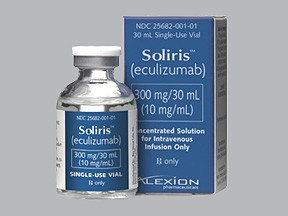ECULIZUMAB - INJECTION
PHONETIC PRONUNCIATION: (e-kue-LIZ-oo-mab)
COMMON BRAND NAME(S): Soliris
GENERIC NAME(S): eculizumab
Uses
USES: This medication is used to treat a certain blood disorder (paroxysmal nocturnal hemoglobinuria). This disorder can cause a decrease in red blood cells (anemia). This medication helps to block the decrease in red blood cells and can improve the symptoms of anemia (e.g., tiredness, shortness of breath) and decrease the need for blood transfusions. This medication may also be used to treat a certain immune system disorder (atypical Hemolytic Uremic Syndrome). It helps to prevent blood clots caused by this disorder. Eculizumab is also used to treat a certain muscle condition (generalized Myasthenia Gravis). It may help to improve symptoms of this condition (such as difficulty swallowing, trouble breathing).
How to use ECULIZUMAB - INJECTION
HOW TO USE: Read the Medication Guide provided by your pharmacist before you start receiving eculizumab and each time you get a refill. If you have any questions, consult your doctor or pharmacist. This medication is given by injection into a vein by a health care professional as directed by your doctor. It is usually given every 7 days for 5 weeks, then every 14 days. The dosage is based on your medical condition. For children, the dosage is also based on the weight. Do not stop receiving this medication without consulting your doctor. Your condition may become worse when the drug is stopped. If you do stop receiving the medication, you may need to be monitored by your doctor for at least 8 or 12 weeks to make sure that your condition does not worsen. Consult your doctor for more details and for symptoms to watch out for. Tell your doctor if your condition does not improve or worsens.
Side Effects
Precautions
Interactions
Overdose
Images
Reviews
Faq for ECULIZUMAB - INJECTION
Eculizumab injection is used to treat certain blood disorders such as paroxysmal nocturnal hemoglobinuria (PNH) and atypical hemolytic uremic syndrome (aHUS).
Eculizumab works by inhibiting a protein in the blood called complement component 5 (C5), which plays a role in causing damage to red blood cells and blood vessels. By blocking C5, eculizumab helps prevent the destruction of red blood cells and maintains healthy blood vessels.
Eculizumab is administered through an intravenous (IV) infusion, usually at a medical facility. The dosage and frequency of infusion will vary depending on the specific blood disorder being treated.
Common side effects of eculizumab may include headache, fatigue, fever, sore throat, common cold symptoms, and nausea. Serious side effects may include infections, allergic reactions, and meningococcal infections. It is important to report any unusual symptoms or side effects to a healthcare provider.
There is limited data on the use of eculizumab during pregnancy and breastfeeding. It is important to discuss the potential risks and benefits with a healthcare provider before using this medication if you are pregnant or breastfeeding.
The duration of eculizumab treatment varies depending on the individual and the specific blood disorder being treated. In some cases, treatment may be lifelong. It is important to follow the prescribed treatment plan and consult with a healthcare provider for guidance.
Warning
WARNING: Eculizumab can lower your body's ability to fight an infection. It can increase your chance of getting a very serious (possibly fatal) brain/spinal cord infection (meningitis). Seek immediate medical attention if you develop any signs of a severe infection (including meningitis), such as high fever, chills, severe headache, persistent nausea/vomiting, stiff neck, mental/mood changes (e.g., confusion), eye sensitivity to light. You should receive the vaccine for meningitis (meningococcal vaccine) at least 2 weeks before receiving this medication. If you have been previously vaccinated for meningitis, ask your doctor if you need to be vaccinated again before receiving this medication. The vaccine will protect most people, but meningitis may occur even in people who have been vaccinated. Therefore, you should still watch for signs of meningitis even if you receive the vaccine. Consult your doctor for more details.
Disclaimer
IMPORTANT: HOW TO USE THIS INFORMATION: This is a summary and does NOT have all possible information about this product. This information does not assure that this product is safe, effective, or appropriate for you. This information is not individual medical advice and does not substitute for the advice of your health care professional. Always ask your health care professional for complete information about this product and your specific health needs.

No Reviews Yet